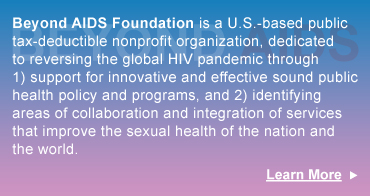August 28, 2011
Honorable Governor Edmund “Jerry” G. Brown, Jr.
Office of the Governor, California State Capitol
Sacramento, CA 95814
FAX: 916-558-3160 (2 pages)
RE: PLEASE SIGN SENATE BILL 41 (YEE), HYPODERMIC NEEDLES AND SYRINGES
Dear Governor Brown:
I am writing on behalf of the Board of Directors of Beyond AIDS, to urge you to sign SB 41 (Yee). SB 41 permits pharmacies to sell up to 30 syringes with needles at a time without prescription, and to permit persons to possess such syringes and needles. We believe this will help to control the transmission of HIV, hepatitis C, and hepatitis B.
Beyond AIDS is a nonprofit organization dedicated to improving public health policy for HIV prevention. Members include physicians, nurses, other health professionals including public health workers, and concerned citizens. My personal background includes 24 years of dedication to HIV testing, counseling, treatment, and prevention, with past positions as an epidemiologist for the Centers for Disease Control and Prevention, and as a county health officer here in California.
Features we like about SB 41 are that no lack of local approval can block its implementation, so that statewide availability will be assured. The number of syringes that can be dispensed at a time has been raised from the 10 permitted (with local jurisdiction approval) by current law to 30, which is much more practical. Pharmacies must also address safe disposal of the syringes. The educational information to be posted on state web sites is also a good feature.
SB 41 will also benefit diabetics and other people who self-administer legal medications, if they do not have prescriptions to pick up fresh needles and syringes. This is important, because insulin itself does not require a prescription, so patients may not have a prescription for syringes either.
The analysis by the Assembly Health Committee staff summarized well the rationale and background for this legislation. The Centers for Disease Control and Prevention recognizes the availability of clean syringes to be a component of a comprehensive HIV prevention strategy. Sharing of hypodermic needles is estimated to have been responsible for approximately 360,000 cases of hepatitis C and 36,000 cases of HIV in California.
SB 41 is necessary because the Disease Prevention Demonstration Project (DPDP), established by SB 1159 and extended by AB 1701, has not proven capable of assuring statewide availability of clean syringes and needles. It has only been authorized by 16 counties and 4 cities. Nevertheless, an analysis by the Department of Public Health published July 2010 showed that in the jurisdictions in which it was active, there were lower levels of syringe sharing, and no increase in unsafe discarding of syringes and needles.
AB 136, permitting local jurisdictions to establish syringe and needle exchange programs, has also not solved the problem, as not enough local jurisdictions have implemented it. In addition, needle exchange programs are more controversial, even within our own organization. Legal sale of syringes and needles by pharmacies are preferable in our opinion, because they make syringes available in more locations during longer hours, do not require expenditure of public funds, and keep this service within the private sector. This allows public health agencies to emphasize infection control (such as how to disinfect syringes) and primary prevention (such as avoidance of drug abuse and referrals to treatment) rather than having to distribute injection implements.
Thank you for carefully reviewing this important legislation. Please sign SB 41 into law.
Sincerely,
Ronald P. Hattis, MD, MPH
President, Beyond AIDS

